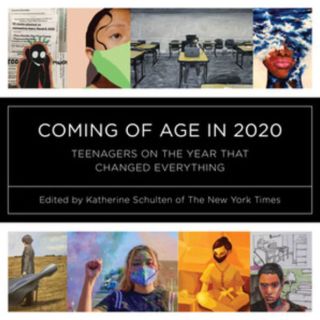Adolescence
Quarantine Generation: The Teen Experience
Teens speak out about their mental health during and after quarantine.
Posted February 21, 2023 Reviewed by Michelle Quirk
Key points
- Teens can be traumatized, anxious, and learning deprived—but they are also creative and resilient.
- Acknowledging teens' hardships and perspectives will be key to their resilience in the wake of the pandemic.
- Listening to teens directly is an essential complement to research on their pandemic experience.

"2020 poured grief, anxiety, fear, and injustice into the soup of uncertainty of growing up," writes 17-year-old Haven Hutchison in Coming of Age in 2020: Teenagers on the Year That Changed Everything (edited by Katherine Schulten). In 2020, a generation of teens already facing the existential charge of climate crisis, intense political divisions, and increasing economic inequality had no choice but to adapt to the sudden and radical changes a global pandemic wrought in their lives.
Before 2020, few would have imagined that teens would start high school and college online, from their bedrooms; that they'd contend with the ensuing isolation, forgo sports and arts programs, and miss homecoming or prom; that their graduations would take place online; that their first romantic relationships would unfold in digital spaces, not physical ones; that they'd experience the threat of illnesses and loss of loved ones; and assume responsibilities most would have expected parents to fulfill.
Numerous studies and commentaries have observed that the global pandemic, lockdowns, and online learning have created a mental health crisis in teens. Coming of Age in 2020 gives teens the opportunity to speak for themselves, through writing, visual art, and video—expressing their struggles and, crucially, their creativity and resilience.
"Here's to 2021," a song by three teens from Juneau, Alaska—Thomas Kaufman, 17; Lance Algabre, 18; and Andrew Garcia, 17—is a good example in the melancholy and hope it expresses. As they write,
This song is inspired by the brutal couple of months that followed the first spike of Covid-19 in the United States. We felt ourselves become anxious, and depressed, and we wrote this song to try and spread some positivity to teenagers all over the world. We recorded different parts at our houses.
Research on teen experiences of the pandemic is prolific, though tentative, because, after all, we are not clear of the pandemic, and the experience is too recent to be studied thoroughly. Many studies focus on social anxiety, developmental delay, learning gaps, and the long-term of effects of the pandemic on teens. One recent study even suggests that the aging of teen brains has been accelerated by the adversities of the pandemic. Another stresses the idea acknowledging that the hardships teens are experiencing are crucial to their resilience.
The voices and art of teens collected in Coming of Age in 2020 feel immediate, intimate, and candid. They are articulate about their multilayered experience. In a poem titled "okay," Suhaylah Sirajul-Islam, 15, writes, "What's it like being a teenager in quarantine / it's the same, I guess, except time passes more slowly." As the poem progresses, its lines suggest life is anything but "the same":
- "it's feeling terrified, because you share a room with your covid-positive aunt, who refuses to see a doctor"
- "and you can hear your dad coughing through the walls"
- "it's processing repressed trauma with your brother and sister"
- "being a teenager in quarantine is radical acceptance / things happened and things are still happening / you'll be okay / you survived, / and you'll be okay."
Like so many of the contributors to the collection, Sirajul-Islam describes—and accepts—contradictory feelings. It's possible to feel terror and be OK, to fear and love family members, to repress and express trauma.
Yishiu (Aimee) Yu, 16, writes about video chatting with her grandmother in China from her home in Massachusetts:
Grandma told me the news in China: the exact location of each infected person was released to the public in order to keep track of positive cases, down to which car of the subway they were on. The deeper I thought, the scarier it became knowing that my grandma's phone had been on her all day. A policy, made for the sake of security, was creating paranoia among the people it was trying to protect; a social dilemma with no absolute right or wrong, was forcing us to isolate and have polarized opinions."
Yu, like so many of her peers in Coming of Age in 2020, is attuned to the intersections of the personal and political the pandemic has made so much more apparent. The testimonies of these teens express a wisdom we can all learn from. While they are clear-eyed about crisis, they are also focused on living, on surviving, and on healing. In "A Student's Guide to Online Learning," Kelsey Smith, 19, offers advice that's both appropriately cynical and supportive: "When your teacher doesn't teach and Professor Google can't teach you. Q drop"; "Virtual clubs are all the rage. Join one, but a warning, there will be an awkward silence"; "And last of all, take a break."
Cici Cao, 16, is representative of teens who found themselves taking on adult responsibilities during lockdown:
My family used to be very active, and we would solve most of our problems by going out in person. However, because of the pandemic, we have to rely on phone numbers and websites. I am the only person in my family who speaks English and Chinese, so as the translator, I had to make this log. I have been a shy person and a big dial-hater; despite that, I still ended up calling countless times.
The lost milestones of growing up—homecoming dances, sports championships, moving into a dorm, a first romantic relationship—are a common theme in the collection. Their writers range through a variety of responses: regret, resignation, humor, and anger. "Pandemic Boyfriend," a song by Amelia Ross, 15, expresses the arc of disappointment alive in so many of their creative works. Ross begins by singing, "This pandemic gave me a boyfriend / He's pretty great," but, by the end, the song becomes a wry take on milestones that just don't translate to a digital world:
The pandemic boyfriend / Wasn't pretty cool / We never did things / When there was no school / That pandemic boyfriend / is old news / Sitting here alone / Not thinking of you.
If one message comes through in Coming of Age in 2020, it's that teens have a lot to say about their pandemic experiences, and they want the rest of us to listen—and learn.
References
Gotlib, Ian H., et al. "Effects of the COVID-19 Pandemic on Mental Health and Brain Maturation in Adolescents: Implications for Analyzing Longitudinal Data." Biological Psychiatry. 1 December 2022. DOI: https://doi.org/10.1016/j.bpsgos.2022.11.002.
Garagiola ER, Lam Q, Wachsmuth LS, Tan TY, Ghali S, Asafo S, Swarna M. "Adolescent Resilience during the COVID-19 Pandemic: A Review of the Impact of the Pandemic on Developmental Milestones". Behavioral Science (Basel). 2022 July 1; 12 (7): 220.DOI: 10.3390/bs12070220. PMID: 35877290; PMCID: PMC9311591.
Rome ES, Dinardo PB, Issac VE. "Promoting resiliency in adolescents during a pandemic: A guide for clinicians and parents." Cleve Clin J Med. 2020 October 1; 87 (10):613–618. DOI: 10.3949/ccjm.87a.20055. PMID: 33004322.




